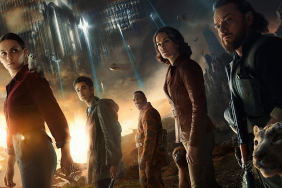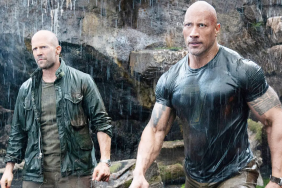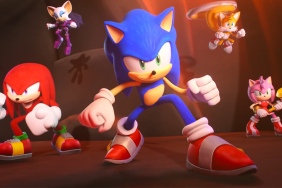Ron Burgundy may be a legend, but the men who brought him to the screen in 2004 have since become legends themselves: writer/director Adam McKay and producer Judd Apatow. They’ve literally defined comedy for the past decade, and they’re closing it out by coming full circle to the movie that started it all with Anchorman 2: The Legend Continues.
Like the first one, this continuation of Burgundy’s saga finds Will Ferrell & Co. parodying the absurdity of broadcasters – this time the team pioneering during the dawn of 24-hour cable news. It’s a refreshing sequel in that it maintains the same exact tone and central cast as the original but doesn’t waste time retreading old jokes. Fans will be delighted to note that it’s just as jaw-droppingly insane and quotable as the first, and we sat down with Apatow and McKay to talk about avoiding retreads, compressing 15 years of devolving news into one month, and marrying billionaire Megan Ellison.
ComingSoon.net: In the first one, the parody was local news and in this one it’s all about CNN and the tabloidization of news. Was that something you knew you wanted to tackle?
Adam McKay: We originally had the idea of going after 24-hour news and cable because it was such a big change in ’79/’80. Then the second you go into it, you realize, “Oh my God! That’s what happened!” So there’s no way to really avoid it. We knew we wanted to hit it and the question became “Can you make it funny?” We don’t want to have it be dry satire ’cause that’s not really the tone of the movie. Then we quickly discovered that if we made it all Ron Burgundy’s fault it was funny. We were really happy that audiences all seemed to recognize it in an energetic way. It pretty much turned out the way we wrote it, too.
Judd Apatow: There was a great documentary about the creation of CNN that we watched, a lot of books about that era that showed what a mess it was in the beginning. It really was kind of a disaster as they were trying to get people to pick up the stations.
McKay: And they actually got the local guys when they needed to fill the slots. They recruited guys from local markets, so Lou Dobbs was a guy they got from I think Seattle. So they would have got Ron Burgundy! It’s not a stretch.
CS: As a writer, how do you write and structure the dialogue for something like this?
McKay: We’re always looking for the backbone, the central idea, and once you have that you know everything can circle around it. In this one the central idea was 24-hour news and the idea that Burgundy and his team were going to take this big jump. The fact that the relationships are so much more important than you think even though it’s a silly comedy, people actually do vaguely care if he’s with Veronica Corningstone, people care about the team.
Apatow: People want him to be a good dad.
McKay: As ridiculous as it is. The best example I can think of is in the movie “Airplane!” As crazy as it is, you want them to land that airplane. Any movie we do usually centers around one idea.
CS: This movie had some crazy marketing schemes with everything that you had Will do. Was there any totally outlandish idea that didn’t actually make it? Also how can you top the marketing for the next movie you do?
Apatow: When we did the first movie, nobody knew the character so we had to work really hard to introduce the character, and Will was really into being Ron Burgundy on the news. I rode around with him in a van and we would go to the different stations and he was so funny. Not many people saw those appearances, I wish we could hunt them all down. He did the John McEnroe talk show then he would go on “The Today Show with Katie Couric.” He would always say to the anchorwoman, “I think I’m falling in love with you,” and he’d lean in to kiss them and they would just turn red! It was so hilarious. Every station he’d just lean in and go, “We’re falling in love right now, aren’t we?” Then we did a Q&A with Bill Curtis for about an hour of Will improvising answers to serious questions. Will set aside a month a year ago and said, “I’m gonna take this month off and we’ll do some fun stuff.” I think the people really liked it.

McKay: I’m trying to think of what he said no to? the rule was it always had to be funny, it had to make us laugh. The only way we did the Dodge spots was if they gave us creative freedom. As far as other movies doing it I dunno if you could do it with other movies. Everyone’s been saying this is a new way to market movies but you can’t have Jake Gyllenhaal from “Prisoners” going to morgues or something. There’s rarely a character like this like a Pee-wee Herman, an Austin Powers has a little bit, I think Jim Carrey has some characters you could do this with.
Apatow: Borat worked a little bit.
McKay: Borat worked, Sacha Baron Cohen’s the guy who really consistently does this, but even Sacha’s like, I remember on “The Dictator” I worked on that a bit and he was very cautious about what he would do, and it had to be this and it had to be that. I don’t think Will’s being that strategic about it. I think he just really loves doing this stuff and if it makes him laugh he’ll do it. That’s kinda been the rule.
CS: You think he doesn’t want to let go of Ron?
McKay: I think he would not be that unhappy if he had to live the next year of his life as Ron Burgundy. If he was allowed to drop it when he went home to his wife and kids I actually think he would do it.
Apatow: He said he did a book signing in-character for Ron Burgundy’s book, which is hysterical by the way. He did a book signing and he tried to be funny with every single person who came up to him for an autograph, do something in character and sign something weird in-character. He said it was EXHAUSTING. (laughs)
CS: This movie is almost a Mad Magazine version of “Broadcast News” in that it’s about that period of the integrity being sucked out of the business. There are a lot of anachronistic details, as if that 20-year period was squished into one year.
Apatow: Totally. We’re vague about what year it is.
CS: How strategic was that in terms of fitting everything in?
McKay: We did that on purpose, we wanted to make it so it wasn’t just CNN so that’s why we had the Australian owner so it’s kind of FOX, even though the sprawl of that happened over the next 15 years we decided to crunch it into a month, make it all Ron Burgundy’s fault. Our rule with laughs is if something’s funny, like we had Jean-Claude Van Damme in his eye which clearly is not the right time period. It’s pretty loose.
CS: “Diff’rent Strokes.”
McKay: Yeah, “Diff’rent Strokes” doesn’t make any sense.
Apatow: “Diff’rent Strokes” makes sense!
McKay: I thought that was ’82 wasn’t it?
Apatow: I remember being at Brand Eigan’s birthday party in fifth grade watching it! (laughs)
McKay: Definitely not Jean-Claude Van Damme, though. But yes the idea was to crunch it all. The idea was to tell a 15 year story in two years.
CS: I thought the callbacks to the first movie were well paced out over the course of the movie, it wasn’t like, “Here’s a joke we did, here’s a joke we did.” How did you know which jokes to bring back, like Baxter’s heroic save?

McKay: It was a BIG topic of discussion, what do you call back and what do you not call back. We all know the bore of seeing the sequel that just repeats everything and we didn’t want that.
Apatow: There’s no dialogue callbacks. For the most part we’re not doing any of the catchphrases, which I thought was great.
McKay: Yeah, there’s no “Stay classy,” there’s none of the “60% of the time?” none of that stuff. We did feel like the gang fight you could bring back, and we did feel Brian had to have some kind sleazy cabinet of some sort. We didn’t want to do the cologne again but we’re like, “Let’s do something different with that.” Honestly the Baxter one we kinda stumbled into. We set up the shark and the love song to the shark and that was just making us laugh. The rule was “Just go for it, let’s be more absurd on this one.” When we realized we had the shark we said, “Oh the shark should come back, oh Baxter should save him. Wait is that too much? We’ll just do it at the end real fast, a real treat Baxter moment.” I think there’s about four bits we call back. The vocal warmups at the beginning of the news but I don’t really think of that as a callback. There’s been a couple of reviews on the internet. One critic said, “The only funny stuff in the movie is the old stuff they call back,” and the other critic said “The only funny stuff in the movie is the new stuff they do,” so that’s a good sign! Between those two there’s a good review! (laughs)
CS: There’s this axiom that a really successful director has this one 10-year period where they’re really on fire?
Apatow: I never heard that before? it’s over! It’s over! (laughs)
CS: Right! We’re coming up on the 10th anniversary of “Anchorman” and “40-Year-Old Virgin,” so how do you guys plan to beat that, stay relevant and keep tapping that zeitgeist?
Apatow: That’s testosterone-based, I think. You really want to work hard when you have testosterone.
McKay: We’re both on human growth hormones! Judd’s head has gotten enormous. He’s got huge dental issues.
Apatow: And rage. My work gets angrier and angrier from the growth hormones. I think there’s a period when you have a lot of energy from 25 to 35 where you just wanna conquer the world and then you get more thoughtful. Or you feel like, “That was enough!” There were things you wanted to accomplish, and then you have to be really passionate about your ideas, because the first feelings of, “It would be great to make a movie” disappear. You got to make a movie. Now it has to be that you’re passionate about thought. There are people I look up to, like Larry Gelbart who was hilarious for a very long time, and Mike Nichols? I just watched “Betrayal” last night on Broadway and it was an amazing piece of work. Obviously Woody Allen keeps going and going. Mel Brooks and Carl Reiner? so we try to hang out with very very hilarious old men so we think we can continue.
CS: You guys are almost on total opposite paths because Judd’s movies keep getting more and more personal and Adam’s movies keep getting huger and zanier.
McKay: Why don’t we say he’s Freudian, I’m Jungian. (laughs) I’ve got bears and minotaurs, all dream images and he’s got sexual dynamics and mortality.
Apatow: I have more emotional problems. (laughs) I can just be silly but part of working is “What’s wrong with me?”
McKay: The one thing too, and I know Judd does this, is the rule the idea has to excite you because you have to put two years of your life into it. What I’ve noticed is even though we’ve had this success I still keep taking ideas out and trying to get ’em made and people still keep saying “No.” I figure as long as that keeps happening you’re on the right track, like I tried getting the Garth Ennis comic “The Boys” made and every single studio was like, “No, we won’t do it.” And I would have killed to make that, so as long as it’s an idea you’re crazy excited for I think you can keep going. I think when you start repeating yourself, “Oh I gotta make some money, I gotta do another movie,” you can start to brownout like that.

Apatow: As long as you continue to hate yourself just a little bit.
McKay: That’s it.
CS: You had that one script, a dystopian future story that sounded amazing called “Channel Three-Billion.”
McKay: Yeah, I love that script! No one will make it. No one.
CS: What’s keeping it from happening?
McKay: It’s basically a future society where everyone has their own TV show, their own talk show, so if you invite someone over to your house you’re like, “Hey, will you come over and be on my talk show?” And all the resources in the world are dedicated towards this massive entertainment machine, literally billions of channels. It’s a really cool script, I wrote it with a friend of mine, and no one will make it. (laughs) Then you get one of those through and you’re really excited.
CS: Get Megan Ellison.
McKay: I know, she’s the key. (laughs) That’s what everyone in Hollywood says.
Apatow: I just married Megan Ellison. Just so she’ll finance my ideas. (laughs)
McKay: Genius idea.
Apatow: It’s a little evil but it’s good for the movie business.
McKay: You look happy.
CS: You have your core crew. How do you add to that crew? Do you find somebody and say, “We want you in our film,” or do people come up to you and say, “I want to be part of this crew, please let me in.”
McKay: That’s a good question. Judd probably has a bit more of a crew than I do. We definitely have a collection of actors we like: John C. Reilly, Richard Jenkins is a guy we want to work with again. But the fun of doing this is you look at movies and go, “I like that guy!” We just got Dylan Baker in this movie and I’ve loved Dylan Baker forever so that’s usually how you find people. There are definitely people that wanna be in your crew and usually, I dunno, there’s something a little desperate and sweaty about that. You wanna find them, I guess, which probably speaks to my low-self-esteem relationship habits. Yeah.
CS: On the same theme the cameos are great. How was that a push and pull? Like did Marion Cotillard want a cameo ’cause that is awesome?
Apatow: She was constantly e-mailing us directly.
McKay: I think she did ask. I think her agent said she’d do something.
Apatow: Sometimes you hear, “That person likes ‘Anchorman'” and then you just remember and then we see who’s around. When we first talked about the cameos getting really crazy I never thought we’d get everyone to fly down to Atlanta at that level, and then they all started saying yes, it was very bizarre.
CS: It was just shocking that you got Drake for that little cameo.
McKay: Drake actually did call us a lot! No joke, his agent for the last year was like, “Drake’s in concert if you wanna go!” I’m like, “I’ve got two kids, I’m not going to a Drake show.” Finally at the end the agent was like, “Is there ANYTHING he can do?” I’m like, “I?m sorry, we don’t have any roles. We have a one-line part but he wouldn’t want to do that.” They’re like, “He’ll do it.” And he flew in and it was literally one line, that was it, but he was thrilled to be there.
Apatow: He was so funny, and it was the opening line of the movie, so it became a big thing. Drake’s no fool.
Anchorman 2: The Legend Continues opens in theaters the evening of Tuesday, December 17. You can check out an interview with Ron Burgundy himself, Mr. Will Ferrell, here.









